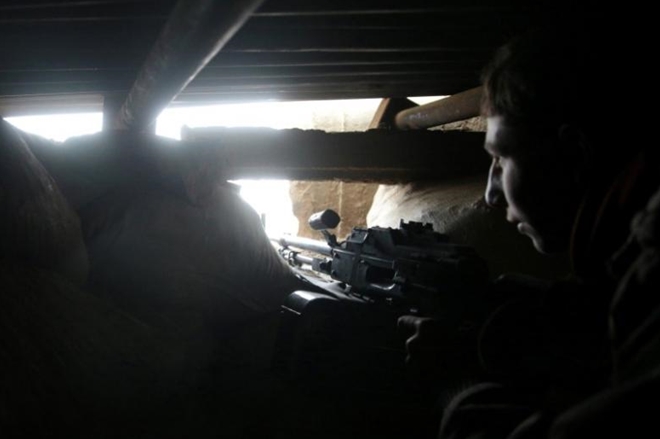Syrian rebels say they froze talks on Russian-backed peace conference due to ceasefire violations
- Rebel officials say Aleppo evacuation plan back on track
- Russia's Putin says Syrian government, opposition sign ceasefire deal
- Erdogan says U.S.-led coalition gives support to terrorist groups in Syria
- Russia calls U.S. move to better arm Syrian rebels a 'hostile act'
In a statement, the rebel groups also said that any territorial advances by the army and Iran-backed militias that are fighting alongside it would end the fragile ceasefire brokered by Russia and Turkey, which back opposing sides, that came into effect on Friday.
"The regime and its allies have continued firing and committed many and large violations," said the statement signed by the mainly moderate rebel groups operating under the umbrella of the so-called Free Syrian Army (FSA).
 |
| A rebel fighter stands on a lookout point with his weapon on the forth day of the truce, on al-Rayhan village front near the rebel held besieged city of Douma, in the eastern Damascus suburb of Ghouta, Syria January 2, 2017. REUTERS/Bassam Khabieh |
The U.N. Security Council on Saturday gave its blessing to the ceasefire deal, which are slated to be followed by peace talks in the Kazakh capital, Astana.
The statement said the main violations were in an area northwest of Damascus in the rebel-held Wadi Barada valley, where government forces and the Iran-backed Lebanese Hezbollah group have been trying to press advances in an ongoing campaign.
Rebels say the army is seeking to recapture the area, where a major spring provides most of Damascus's water supplies and which lies on a major supply route from Lebanon to the Syrian capital used by Hezbollah.
Like previous Syria ceasefire deals, it has been shaky from the start, with repeated outbreaks of violence in some areas, but has largely held elsewhere.
The rebel groups questioned Russia's ability to force the Syrian government and their allies to abide by the terms of the ceasefire deal.

